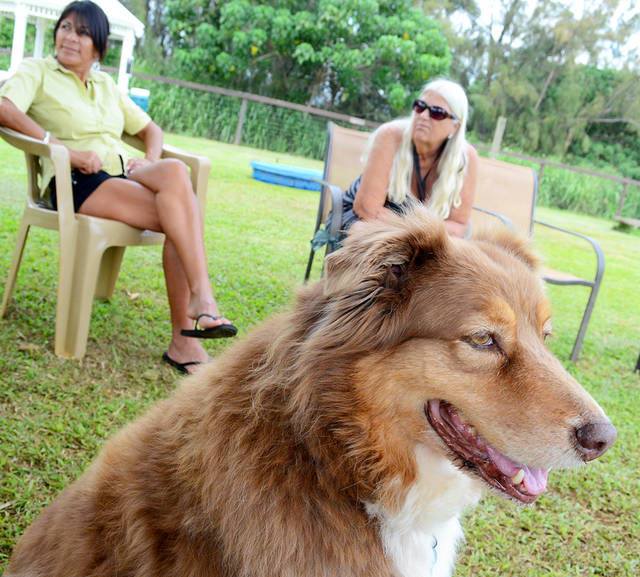HONOLULU — Some Hawaii lawmakers are pushing to criminally charge people who leave their dog tied up too long. The House Agriculture Committee recently unanimously approved Senate Bill 700, which wants to make tying dogs to a chain shorter than
HONOLULU — Some Hawaii lawmakers are pushing to criminally charge people who leave their dog tied up too long.
The House Agriculture Committee recently unanimously approved Senate Bill 700, which wants to make tying dogs to a chain shorter than 10 feet for longer than 24 hours a second-degree animal cruelty charge, unless the dog is “engaged in a supervised activity or is being transported,” according to the bill.
Second-degree animal cruelty is a misdemeanor, which is punishable by up to one year in jail.
The measure was introduced in the Senate in January and was transmitted to the House of Representatives on March 7.
It defines tethering as the practice of keeping a dog continually chained to a stationary object, like a tree, doghouse or fence, which limits its movement.
It would also require chained dogs to have access to water and shade and prevent owners from chaining dogs younger than six months.
“While restraining a dog in this manner for short periods of time may be acceptable for purposes such as exercising, training, or taking the dog outdoors, continual restraint over a long period of time often results in the dog becoming neurotic, anxious and aggressive,” the bill reads.
Marilyn Seligman, who owns three dogs, Rhylee, Elsa and Kiah, said the measure is a step in the right direction of holding pet owners accountable.
“There’s responsibility with animals,” she said.
But it might take an attitude change, Seligman added.
“People have such different attitudes about what a dog means to them. Sometimes, people may get a dog, but then it ends up outside,” she said. “They have good intentions, but it doesn’t work out.”
Another example is hunting dogs, which may be seen as more of a working dog than a pet, Seligman said.
Patricia Murray, who owns a 1-year-old puppy named Venice, said the measure would prevent accidents.
“Dogs can get vicious if they don’t expend energy,” she said.
Murray and Seligman were enjoying the day with their animals at the Kauai Humane Society dog park Thursday.
Both women said they let their dogs roam free at their homes.
“I have a fenced in yard, and she goes in and out whenever she pleases,” said Murray, who lives in Poipu.
Seligman, who lives in Kalaheo, said she’s never had a reason to put her dog on a chain or in a kennel.
“The doors are always open until we go to bed,” she said.
According to Section 711-1109 of Hawaii Revised Statutes, dogs can be kept in a kennel if they have access to food, shade water, are protected from the elements and have enough room to stand, sit, and turn around comfortably.
The area must also be kept clean and “free from excess or other contaminants.”
While dog tethering is a common practice on Kauai, there have not been any serious injuries to the animals, said Scott Pisani, executive director of the Kauai Humane Society.
“We do feel that families deciding to tether their dog should become educated about other possible options for containment as well as the safest approaches for tethering,” he said.
As SB 700 moves through the legislative process, lawmakers have a few things to consider, Pisani said.
“We hope the Legislature considers issues around enforceability of the bill in its final form,” he said. “The practicality, cost and community support will all impact whether the bill as written will accomplish the goals of the legislation.”
Murray and Seligman agree education is key to improving the health and safety of pets.
“If the humane society had information or suggestions about where to buy equipment to build fences or even kennels, owners would have less excuses,” she said.
Murray suggested forming a volunteer group that would help people put up fences.
However it’s handled, education needs to be done gently, Seligman said.
SB 700, which also seeks to protect native birds, was passed by the House Agriculture Committee on March 24. It will be discussed next by the Judiciary Committee, but a hearing has not been set.
Rep. Dee Morikawa (D-16, Niihau, Lehua, Koloa and Waimea), who sits on the committee, said she is waiting for public testimony to comment on the bill.


